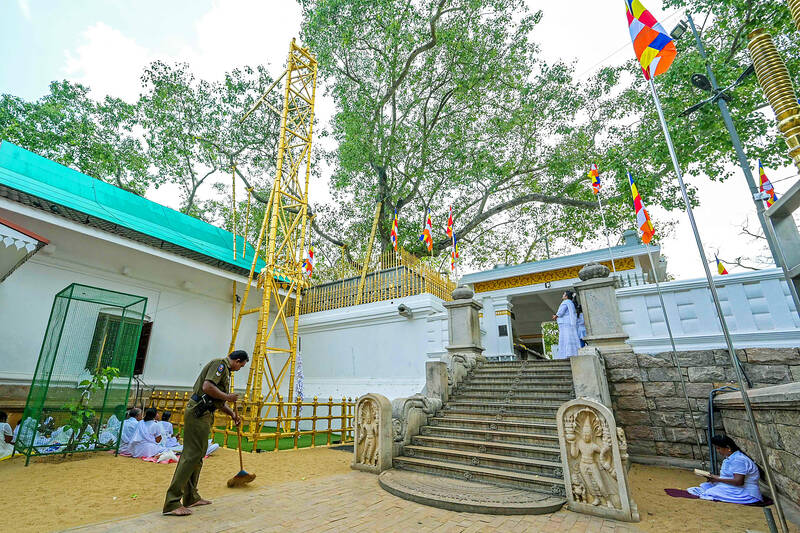When social media was inundated with rumors that Sri Lanka’s holiest tree was being harmed by 5G mobile signals, Colombo’s cash-strapped government pulled out all the stops.
Sri Lankan President Ranil Wickremesinghe dispatched a high-powered team of experts to the 2,300-year-old Sri Maha Bodhi tree in the sacred city of Anuradhapura, an ancient capital of the South Asian nation.
It included the head of the telecom regulator, his technical chief and the director of the National Botanical Gardens, along with university professors and district administrators.

Photo: AFP
Visits were made, surveys were carried out, and the centuries-old tree was examined and monitored before a conclusion was reached: there were no 5G signals in the area in the first place.
The episode highlighted the speed with which fake news travels in Sri Lanka — but even more so, it illustrated the reverence with which the country holds the Sri Maha Bodhi.
The tree is believed to have been grown from a cutting of the bodhi tree in India that sheltered the Buddha when he attained enlightenment more than 2,500 years ago.
It is an object of worship and a symbol of national sovereignty on the majority Buddhist island of 22 million people.
The first claims it was under threat appeared on a local Web site: 5G radiation from towers near the tree was supposedly turning its leaves black, and it was at “great risk” of eventually shedding them all and dying.
Memes were shared widely on Facebook and WhatsApp groups, and a TV presenter repeated the theories on his YouTube channel.
The chief monk of the Bomaluwa Temple that houses the tree in Anuradhapura, 200km north of Colombo, was accused of taking bribes from telecom operators to let them set up 5G base stations nearby.
“I am not a scientist, nor a botanist, so I raised the issue with the president in February,” monk Pallegama Hemarathana, 68, said. “He immediately appointed a panel of experts.”
“The government and the Buddhists will do whatever it takes to protect the Sri Maha Bodhi,” he said.
There are four older base stations within 500m of the tree, but Sri Lankan Telecommunications Regulatory Commission Director-General Helasiri Ranatunga said that there was “no 5G coverage in the sacred area as rumored.”
Radiation in the area was well below WHO thresholds, and botanical experts had ruled there was no threat from existing 2G, 3G or 4G coverage, he said.
However, the panel did recommend banning mobile phone use to preserve the temple’s tranquility, he added.
While there are already signs in place to that effect, they are widely ignored by the hordes of visitors who come to the site.
At the moment, fresh heart-shaped, purple-green leaves are sprouting on the tree.
Botanically a Ficus religiosa — also known as a “bo” — the tree is worshiped by thousands of Buddhists daily as a symbol of the “living Buddha.”
Comparatively small despite its long history, it is propped up by 10 gold-plated iron supports and dwarfed by another bodhi a short distance away.
However, no one is allowed within an arm’s length of the tree. The original tree in India is said to have died centuries ago.
Its Sri Lankan descendant was the scene of a terror attack in March 1985 by separatist Tamil Tiger rebels that left more than 120 people dead.
Since then, the tree has been provided with airport-style security, with visitors going through metal detectors and pat-downs. It is surrounded by two gold-plated fences and protected around the clock by monks, police and armed troops.
Several men are also deployed to clap their hands and chase away squirrels, birds and monkeys that could threaten the tree.
Sashika Neranjan, 39, was visiting on a recent day with his extended family.
“Our sister and brother managed to get permanent residency in Australia after taking a vow here,” he said. “We are here to thank the sacred bo tree.”

STEPPING UP: Diminished US polar science presence mean opportunities for the UK and other countries, although China or Russia might also fill that gap, a researcher said The UK’s flagship polar research vessel is to head to Antarctica next week to help advance dozens of climate change-linked science projects, as Western nations spearhead studies there while the US withdraws. The RRS Sir David Attenborough, a state-of-the-art ship named after the renowned British naturalist, would aid research on everything from “hunting underwater tsunamis” to tracking glacier melt and whale populations. Operated by the British Antarctic Survey (BAS), the country’s polar research institute, the 15,000-tonne icebreaker — boasting a helipad, and various laboratories and gadgetry — is pivotal to the UK’s efforts to assess climate change’s impact there. “The saying goes

FRUSTRATIONS: One in seven youths in China and Indonesia are unemployed, and many in the region are stuck in low-productivity jobs, the World Bank said Young people across Asia are struggling to find good jobs, with many stuck in low-productivity work that the World Bank said could strain social stability as frustrations fuel a global wave of youth-led protests. The bank highlighted a persistent gap between younger and more experienced workers across several Asian economies in a regional economic update released yesterday, noting that one in seven young people in China and Indonesia are unemployed. The share of people now vulnerable to falling into poverty is now larger than the middle class in most countries, it said. “The employment rate is generally high, but the young struggle to

ENERGY SHIFT: A report by Ember suggests it is possible for the world to wean off polluting sources of power, such as coal and gas, even as demand for electricity surges Worldwide solar and wind power generation has outpaced electricity demand this year, and for the first time on record, renewable energies combined generated more power than coal, a new analysis said. Global solar generation grew by a record 31 percent in the first half of the year, while wind generation grew 7.7 percent, according to the report by the energy think tank Ember, which was released after midnight yesterday. Solar and wind generation combined grew by more than 400 terawatt hours, which was more than the increase in overall global demand during the same period, it said. The findings suggest it is

FIRST STAGE: Hamas has agreed to release 48 Israeli hostages in exchange for 250 ‘national security prisoners’ as well as 1,700 Gazans, but has resisted calls to disarm Israel plans to destroy what remains of Hamas’ network of tunnels under Gaza, working with US approval after its hostages are freed, it said yesterday. Israeli Minister of Defense Israel Katz said that the operation would be conducted under an “international mechanism” led by the US. “Israel’s great challenge after the hostage release phase will be the destruction of all Hamas terrorist tunnels in Gaza,” Katz said. “I have ordered the army to prepare to carry out this mission,” he added. Hamas operates a network of tunnels under Gaza, allowing its fighters to operate out of sight of Israeli reconnaissance. Some have passed under